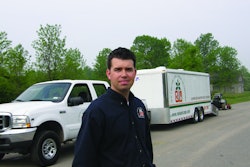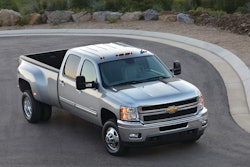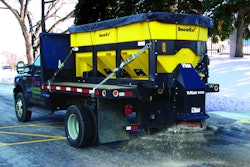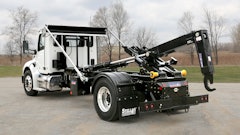
The story of how Kevin Davis got into the landscaping industry is not unlike many contractors’. What’s a departure from the norm is how he’s methodically built his business to over $20 million a year without the use of even one dedicated salesperson.
That’s right, CLS Landscape Management based in Chino, CA, does not employ salespeople. You can’t argue with the strategy, because it certainly appears to be working. Sales have grown 50% since 2006, which includes 17% growth through the recent recession.
“We concentrate on building our business through the people in the trenches: our branch managers,” Davis explains. “Our keys to sales growth have been consistency, dedication to detail, and building relationships.”
Davis started CLS Landscape Management out of his father’s backyard in 1983 at the age of 21. “I initially focused on residential installation, but that business was too unstable,” Davis says. “So I decided early on that maintenance provided the residual income and consistency I needed to build a business on.”
Today roughly 60% of CLS Landscape Management’s annual revenue comes from commercial maintenance. The company doesn’t even dabble in residential installation anymore. CLS operates in four counties and roughly 60 cities via its seven branch locations: Montclair, Pomona, Azusa, Simi, Lake Elsinore, Grand Terrace and Chino.
Grooming Growth
While Davis knew early on that he wanted to build a prosperous landscape maintenance business, he also knew that he needed strong people to do it. His philosophy was, and is, to hire people with potential—and groom them.
The average tenure for one of CLS Landscape Management’s 350 employees is 10 years. One of the reasons people stick around is that there is room for growth.
“We are a company that builds from the bottom up,” Davis says. “All of our leaders have worked their way through the ranks. This system has produced the leadership that drives the company to constantly improve as we grow.”
According to Davis, a strategy like this can only work when senior management is dedicated to their employees. “You have to be focused on the advancement of the people within the company, not just the company itself,” Davis says. “A company’s success and long-term survival is based on people believing in what they are doing, not just in what you are paying them. Instilling ownership and the idea that they are part of something bigger than themselves is what keeps a company growing.”
Case in point: Laura Hansen. She’s been with the company from the very beginning, starting out as office manager before gradually developing into the CFO. Hansen is Davis’ sister-in-law.
Pat Strohman was initially hired in 1993 due to his background in lawn care. CLS was expanding into this area, so it was necessary to hire someone to play a vital role in overseeing production and business development. Today, Strohman is senior vice president. He’s a nuts-and-bolts type of manager who’s in direct contact with each of the company’s branch managers. Davis, on the other hand, places the majority of his attention on finances and strategic direction for the company.
The company’s present strategic direction is geared toward homeowner associations, although additional business comes from municipalities and school districts, along with a few churches and apartment complexes.
Generally speaking, though, CLS stays away from apartment complexes since they tend to be low-bid, high-expectation jobs—which result in low margins. As for church accounts, CLS looks for jobs that are fairly simple to maintain and have basic landscape needs.
“We are very careful not to take on work that doesn’t fit our profile,” Davis points out. “If we feel that we can’t perform any parameter to the highest quality, we will not bid on it.”
When CLS Landscape Management is presented with an opportunity that does fit their profile, they make sure the client is well aware of their “corporate capabilities”, which can be broken down into five main areas:
- Résumé – CLS Landscape Management services more than 200 HOAs, along with several area municipalities (which are listed with dates of service)
- Well-maintained trucks and equipment that proudly display company logo
- Staff that is in constant contact with the corporate office via cell phones and pagers – crews can be dispatched quickly when a problem arises
- Well-trained and certified staff – 17 irrigation techs who receive ongoing training and certification in water management, reclaimed water and backflow testing; tree division led by a certified arborist; licensed pesticide applicators
- Green waste – The company recycles 100% of the green waste it generates for re-use on the properties it maintains
Mulching Creates New Revenue Stream
CLS Landscape Management actually started mulching back in 2004. Davis felt that putting all of that green waste into a dump was environmentally wrong, and that “great mulch” was the future of landscaping in southern California. “I never thought it would turn out to be such a marketing advantage,” Davis relates. “I just felt that it was the right thing to do.”
Initially, mulching was a service CLS provided at no charge to the cities and HOAs the company maintained. Once the market saw that CLS was providing high-quality recycled mulch, vendors and even other landscape companies began inquiring. Now CLS sells them some of the mulch it manufactures, creating a brand new revenue stream.
“There is such a focus on the area of green recycled mulch that we believe it will become a bigger and bigger part of what we do in the future,” Davis says.
Getting into the mulching business doesn’t happen overnight. Davis says that a $3 million to $5 million investment in land and equipment is needed in order to mulch correctly and meet all of California’s requirements and guidelines. “But if you have long-term goals, as our company does, that investment will pay off in the long run,” Davis says.
Last year was the first full year CLS Landscape Management actually went into the business of manufacturing and selling mulch. “Our mulch is in high demand due to its quality; we don’t have any animal, palm, trash or grass byproducts in our mulch,” Davis points out. Thus far, word of mouth is all the company has needed to start generating a healthy amount of orders.
“It takes a tremendous amount of knowledge and equipment to even entertain the idea of starting up a mulching business,” Davis says. “I suggest starting out on a small scale, like we did, and learn the pros and cons of producing good mulch before jumping into a retail business.”
Ever since he was a wild-eyed 21-year-old, Kevin Davis understood the merits of taking things slowly and building from the ground up. He’s been a firm believer that growth happens naturally when your people believe in what they are doing and consistently deliver the service customers deserve. Now presiding over a $21 million commercial maintenance company, it’s safe to say that his beliefs are indeed correct.





















